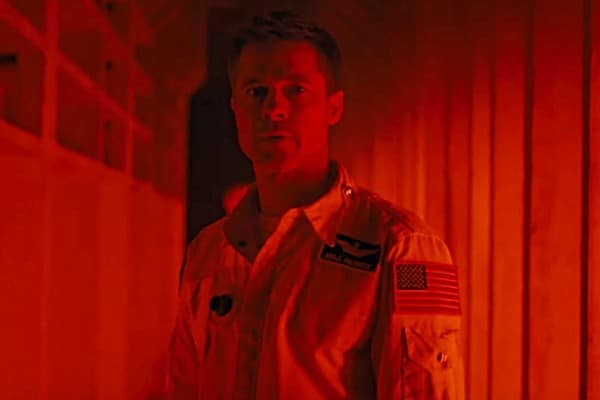Ad Astra, Revisted in 2021

(Spoiler alert on Ad Astra)
I didn’t expect 2019’s Ad Astra to hold this much relevance come the year after its release. I mean, it’s a good film right from the get-go, don’t get me wrong. But I didn’t expect how eerily relevant and relatable its themes come 2020 and 2021. Its themes of loneliness and mental health parallel experiences in this global pandemic, eerie the foreshadowing maybe. Let’s dive into the relevant themes of Ad Astra’s spacey abyss.
Wait, What’s Ad Astra All About?

Ad Astra is a sci-fi film co-written and directed by James Gray. It stars Brad Pitt as Roy McBride, an astronaut on a mission to establish communication with his estranged father. His father, astronaut H. Clifford McBride (played by Tommy Lee Jones), is presumably gone rogue and threatening life on Earth. With the threat posed by his father, Roy must transmit messages from Mars to his father’s last point of contact beyond. From then on, Roy ventures to The Moon, Mars, and beyond.
Though it may sound too high-concept of a premise, Ad Astra delves into a grounded reality. It’s an existential journey that explores the human condition and the father-son dynamic. The film holds your hand in Roy’s journey, even when that journey reaches a cold and isolating temperature.
The film explores themes of depression and existential isolation, among other topics discussed. It shows the isolating nature of obsession, loneliness, and hopelessness. Roy’s notably calm demeanor is challenged throughout this film, as it slowly erodes as he ventures deeper into space. In that erosion, he slowly starts to feel and empathize with what his father has been through. This reconnects both father and son emotionally and metaphorically in such a haunting chill.
SEE ALSO: John Wick (2014): Economy In Storytelling
The Eerie Zeitgeist Of Ad Astra

It felt eerie when I rewatched it on Netflix a few weeks ago (I watched it the first time in the cinema in 2019). I mean, I did understand and empathize with its characters and themes on first viewing. But with the global pandemic and the rotation of lockdowns, it’s now tough not to empathize or at least relate with the film’s themes of depression and existential isolation. Even weeks after rewatching, it is intensely profound.
The film lulls viewers into a sense of isolation via Pitt’s narration, Roy’s crackling progression, and Jones’ performance. Not to mention the lived-in environs of human-conquered space. The feeling of isolation, shown especially in Clifford’s characterization, can be akin to both societal or familial/social isolation. Clifford is isolated in the derelict remains of the Lima Project, having a nihilistic disregard for humanity and his son.
It’s almost therapeutic or even cathartic in a way. It’s understandable in 2019, but not to such a resonating point compared to now, considering apparent circumstances. It is oddly cathartic to see loneliness portrayed on screen, especially for me when obsession plays a crucial part in it. As we float in our little Spaceship You’s, as CGP Grey would say, this metaphorical capsule feels like it’s supposed to help us self-improve.
Obsessions

In some cases, germaphobia and agoraphobia can seep in. We try to keep everything to what we see as a “perfect room” or “perfect Spaceship You’s.” But the anxiety and insomnia caused by this perfectionism it’s such obsessive feelings. It’s like a mission to perfect, much like Clifford McBride’s obsession for the Lima Project’s objectives. Clean rooms equate to no risk of coronavirus for me, whatever it takes. That was the persistent feeling.
In such conditions, isolation can create or increase obsessive tendencies, or vice versa. Ad Astra shows this in Clifford’s despair in completing the mission of finding life, even when it’s a lost cause.
In my case, it’s the aforementioned obsessions with cleanliness. There’s a feeling of brain locks and anxiety when my perceived notion of cleanliness is challenged by “outside factors.” “Outside factors” are weekly room maintenance and room sharing. I know it’s so irrational to be scared of it, but there are episodes of anxiety caused by this obsession. Take a look at this clip from Scorsese’s The Aviator to get what I’m talking about.
SEE ALSO: Overcoming Germophobia in a Pandemic Burnout World
The Heart of Ad Astra’s Darkness

(Spoiler alert on Ad Astra’s ending)
Clifford McBride holds an abstract representation of isolating depression and the irrational obsession that comes with it (or vice versa). And yet, in some eerie coincidence, that isolation is intensely felt during this pandemic. I guess not to that same extent for some people, but it’s impossible never to feel or empathize with it. Go ask Bo Burnham about it.
With the rogue nihilism motivating his antagonistic role in this story, so comes the broken and repairable humanity lying within. Though he dies in his own hands, there was still a spark of humanity brought back with Roy’s rescue. Familial bonds are unconditional, which can get reparation in a person’s emotional state, much like other close bonds.
I guess bonds do help in one’s emotional recovery, especially as one as dour and trying as the current pandemic-despite Ad Astra’s bleakness. Even for an introvert like me, memories of bonds, small they may be, can be an excellent grounding mechanism.
Reflections

I guess it is therapeutic to see the depth of an extra-terrestrial existential abyss like this. Art can help in providing personal reflections to an audience- some pieces may even function solely as that. The Discarded Image did a great video on David Lynch, showing the therapeutic benefits of film as therapy. They discuss how films are like dreams trying to communicate to our conscious minds-a therapy sessions for both the artists behind the work and us, the audience.
Ad Astra did help me confront, or at least reflect on agoraphobia and germaphobia. With Tommy Lee Jones’ subtly powerful supporting performance, the film’s abstract representation of existential isolation and obsession is thoroughly realized and realized to the point of having a substantial therapeutic impact, like seeing repressed and subconscious thoughts on a screen’s surface. It makes us mindful of it. However small that conscious and subconscious reflection may be, it’s still a therapeutic step to recovery.
I got my first dose of vaccine already, so it did help me loosen up my germaphobia a bit. It felt like a key. I guess Brad Pitt’s character was like that type of key for Tommy Lee Jones’s character in Ad Astra’s ending. Mine was more a literal medicinal one, while Ad Astra implores a purely humanistic, emotional, and poetic one. And it’s a film (or art in general) that helps us recognize those keys to recovery. Again, it makes us mindful of it, and we appreciate the recovery.
Ad Astra is a great therapy movie for 2021, especially for obsessed germaphobes and agoraphobes!








2 comments